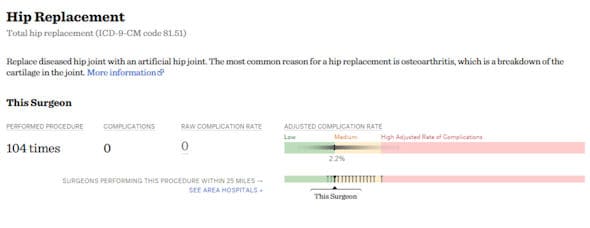- How Do You Know The Risks Associated With Surgeon Or Hospital?
- Why Is It Easier To Get Information On Buying A Car Than On A Surgeon?
- You Can’t Know From Word of Mouth
- You Can’t Control Hospital Privileges For Your Surgeon
- You Have More Data Available To You When You Buy A Car
- What Is The Most Important Criteria?
- What Can You Do?
- Use The ProPublica Surgeon Scorecard As A Tool
- Search The Surgeon Rating Database
- ProPublica Methodology
- About ProPublica
How Do You Know The Risks Associated With Surgeon Or Hospital?
You don’t know the risks – it is that simple. In fact, realistically, nobody does. That is why they call it the ‘practice’ of medicine. Many problems confront you with selecting an orthopedic surgeon. Let’s briefly touch on a couple of issues that focus upon what you can’t do.
Why Is It Easier To Get Information On Buying A Car Than On A Surgeon?
It seems that a surgery is more expensive (generally) than buying a car and a surgery is more personal, yet it is so easy to find accurate data, comparisons, technical reviews, stats, pricing and a myriad of other factoids than data points for your surgery.
You Can’t Know From Word of Mouth: Your best friend, your boss, your mother-in-law (as usual) tells you, “Oh, Dr. Jones is the best doctor ever.” What do these friends really know about surgeon qualifications, medical outcomes, pricing, quality of care, infection rates, copayments, length-of-stay averages and quite a few other issues that are hard to quantify, let alone get that information and then, somehow, compare it.
You Can’t Control Hospital Privileges For Your Surgeon: Now assume you have, again – somehow, analyzed data and determined that Mercy Hospital is the best hospital in the area for you and you want your hip replacement surgery performed there. Your medical insurance plan will have a list of participating physicians. Each surgeon will have privileges at one or more hospitals. There is no guarantee your surgeon will have privileges at Mercy. You have to trust that your insurance plan, your surgeon and your hospital are ‘right’ for you.
You Have More Data Available To You When You Buy A Car: There are many companies that provide accident reports, reliability analysis, impartial reviews and the like. There are very few that do for something far more important – your surgery. So, are you ‘feeling lucky.’
 Lucky shouldn’t be the way to pick a surgeon.
Lucky shouldn’t be the way to pick a surgeon.
What Is The Most Important Criteria? If you have to prioritize, pick the best doctor over the best hospital.
What Can You Do? So, the above is what you can’t do. What about something you can do.
You can elect not to go to a surgeon or hospital based on impartial data, such as the data from ProPublica’s Surgeon Scorecard. Worst, worst case is that you change medical insurance plans (examining any pre-existing conditions waiting period) and select an option that gives you access to your desired surgeon.
Use The ProPublica Surgeon Scorecard As A Tool: ProPublica created searchable database, Surgeon Scorecard, reports adjusted complication rates for 16,827 surgeons operating at 3,575 hospitals. No rate is reported if a surgeon performed an operation fewer than 20 times. For the eight surgeries combined, the analysis identified 63,173 patients who were readmitted with a complication and 3,405 who died. Medicare paid hospitals $645.3 million for these readmissions alone.
Below is a sample report on a physician. Is it foolproof? Is it perfect? Does it guarantee a perfect outcome? No, no and no. But it is probably a better way to examine this issue than what you were planning.
Search The Surgeon Rating Database: Go to the ProPublica searchable database, Surgeon Scorecard, and find your doctor and/or hospital.
ProPublica Methodology: For its analysis of surgical complication rates, ProPublica acquired Medicare billing records for in-patient hospital stays from 2009 through 2013. We focused on eight common elective surgeries – knee replacements, hip replacements, three types of spinal fusions, one in the neck and two in the lower back, gall bladder removals, prostate removals, and prostate resections. ProPublica chose these surgeries because they are typically performed on healthy patients and are considered relatively low risk. ProPublica screened each patient’s record for signs of other health problems, like obesity and diabetes and then assigned them a health score. To calculate the adjusted complication rate, we used a statistical method called a mixed effects model, which takes into account fixed factors like age and health score, and variable effects, like the performance of surgeons and hospitals. Read more on the ProPublica methodology
About ProPublica: ProPublica is an independent, non-profit newsroom of 45+ working journalists that produces investigative journalism in the public interest. According to the ProPublica site, “A series of our stories won the 2011 Pulitzer Prize for National Reporting, the first such prize ever for stories not published in print. One of our stories was awarded a Pulitzer Prize for Investigative Reporting in 2010, the first such award to an online news organization. Another story, broadcast in partnership with This American Life, won a Peabody Award in 2013. In 2014, ProPublica received a MacArthur Award for Creative & Effective Institutions.”

